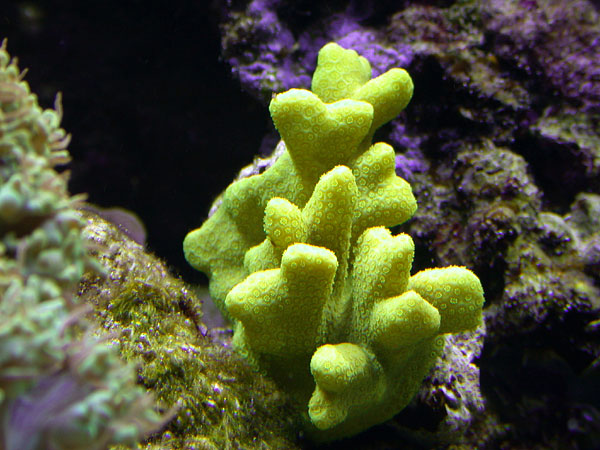Hello everyone!
All the threads recently discussing ocean acidification got me wondering: what are the survival/growth limits of corals as related to pH level?
To give some context, from what I've seen, we know that corals can grow at pH levels ranging from ~7.6-8.5, with faster growth typically seen somewhere around 8.2-8.3 and up. As I understand it, that faster growth is at least partially due to lower amounts of hydrogen ions in the water binding with carbonate ions and essentially competing with the corals for skeleton-building resources, but I also understand this is only part of the picture and that this specific phenomenon is largely correlated with higher levels of CO2 (which, while not necessarily directly pH related, is still of interest for my question here, as I'm looking more at generalities relating to corals and pH and less at specifics). Additionally, I understand that some corals (particularly more "boulder"-like corals) are better able to cope with lower pH waters, likely due to their growth forms.
So, what I'm wondering here is, generally speaking (i.e. addressing all/most corals as a group rather than addressing specific coral species, which would likely have considerable variation between them), how low and how high could the pH go before the corals stop growing altogether, and how low and high could it go before the corals start dying from the effects? What are some other pH related phenomena that may impact coral growth/survival (like the high CO2 levels generating higher hydrogen ion concentrations discussed above)? Are there things we could do (in a controlled, aquarium study sort of setting) to work around/overcome these effects and promote coral growth and/or survival beyond their natural limits?
For examples:
-Assuming all other measurable conditions are acceptable, could a coral survive/grow at a pH of 5.8? How about at a pH of 10+? (What are the absolute pH limits for coral growth/survival without intervention?)
-In a high CO2 environment (which would presumably be relatively low pH compared to average ocean/aquarium levels), with the hydrogen ions binding with carbonate ions and reducing resources for coral skeleton growth, could we do something like dose carbonate to continue helping corals grow (or grow faster) despite the limitations caused by the high concentration of hydrogen ions?
I know this is really multiple questions in one, but I'm still getting a handle on the chemistry side of things with marine environments, and I view these things as all being related. So, I figured I would group them together for this thread.
As a note here, I am not looking to discuss politics/policies, energy production, businesses/business practices, climate change, or related topics with this thread (there are plenty of threads about those issues already), I'm literally just looking at the biological and chemical limitations (and potential solutions for those limitations) for corals and their environments as they relate to pH and coral growth/survival.
All the threads recently discussing ocean acidification got me wondering: what are the survival/growth limits of corals as related to pH level?
To give some context, from what I've seen, we know that corals can grow at pH levels ranging from ~7.6-8.5, with faster growth typically seen somewhere around 8.2-8.3 and up. As I understand it, that faster growth is at least partially due to lower amounts of hydrogen ions in the water binding with carbonate ions and essentially competing with the corals for skeleton-building resources, but I also understand this is only part of the picture and that this specific phenomenon is largely correlated with higher levels of CO2 (which, while not necessarily directly pH related, is still of interest for my question here, as I'm looking more at generalities relating to corals and pH and less at specifics). Additionally, I understand that some corals (particularly more "boulder"-like corals) are better able to cope with lower pH waters, likely due to their growth forms.
So, what I'm wondering here is, generally speaking (i.e. addressing all/most corals as a group rather than addressing specific coral species, which would likely have considerable variation between them), how low and how high could the pH go before the corals stop growing altogether, and how low and high could it go before the corals start dying from the effects? What are some other pH related phenomena that may impact coral growth/survival (like the high CO2 levels generating higher hydrogen ion concentrations discussed above)? Are there things we could do (in a controlled, aquarium study sort of setting) to work around/overcome these effects and promote coral growth and/or survival beyond their natural limits?
For examples:
-Assuming all other measurable conditions are acceptable, could a coral survive/grow at a pH of 5.8? How about at a pH of 10+? (What are the absolute pH limits for coral growth/survival without intervention?)
-In a high CO2 environment (which would presumably be relatively low pH compared to average ocean/aquarium levels), with the hydrogen ions binding with carbonate ions and reducing resources for coral skeleton growth, could we do something like dose carbonate to continue helping corals grow (or grow faster) despite the limitations caused by the high concentration of hydrogen ions?
I know this is really multiple questions in one, but I'm still getting a handle on the chemistry side of things with marine environments, and I view these things as all being related. So, I figured I would group them together for this thread.
As a note here, I am not looking to discuss politics/policies, energy production, businesses/business practices, climate change, or related topics with this thread (there are plenty of threads about those issues already), I'm literally just looking at the biological and chemical limitations (and potential solutions for those limitations) for corals and their environments as they relate to pH and coral growth/survival.




















